X
wikiHow is a “wiki,” similar to Wikipedia, which means that many of our articles are co-written by multiple authors. To create this article, 14 people, some anonymous, worked to edit and improve it over time.
This article has been viewed 63,940 times.
Learn more...
Dentures are dental appliances that replace missing teeth and help you live a normal life. Once you have dentures, it’s important to keep them clean – dirty dentures can allow bacteria and fungus to proliferate, leading to inflamed gums and bad breath. Most people also want to avoid staining their dentures for aesthetic reasons. If you'd like to keep your new smile fresh and white, this article will help.
Steps
Method 1
Method 1 of 4:
Preventing Stains from Forming
-
1Use a straw when drinking beverages that cause stains. When drinking something that will stain your dentures – coffee, tea, carbonated drinks, fruit juices, and, when blended into beverages, fruits like berries – remember to use a straw. Drinking through a straw allows the beverage to bypass your teeth, and you’ll avoid stains, especially at the front.
-
2Quit smoking. Tobacco can stain your dentures, so quit smoking if you can. Otherwise, try, at least, to limit the number of cigarettes you smoke.[1]Advertisement
-
3Rinse with water after eating or drinking. After meals, and especially if you have coffee, tea, wine, or something else that will stain, rinse your dentures thoroughly under running water.
- If you can’t get to a place to rinse your dentures well, having a drink of water will help remove any colorants.
-
4Eat crunchy fruits and vegetables. Foods like berries, tomatoes, soy sauce, and balsamic vinegar will stain your dentures, but you can mitigate the damage by eating crunchy fruits and vegetables, like apples and celery. These foods will naturally cleanse your dentures.
-
5Brush well. You should brush your dentures at least twice daily, just as you would brush your teeth. Make sure that your brush reaches every part of the dentures, but don’t push down too hard: you don’t want to break them.[2]
- Consider buying a special toothbrush made for dentures.
- Use a toothbrush with soft bristles. Hard ones can scratch your dentures, reducing their sheen.
-
6Soak your dentures in water overnight. When you go to bed, remove your dentures and leave them to soak in a glass of water, or fill your denture container with water and soak them there. Soaking will loosen any plaque and food debris that could cause stains.[3]
- Do not put your dentures in hot water – this could warp the shape of your dentures or cause them to shrink.
- Do not soak your dentures overnight in anything but plain water. Prolonged exposure to soaps and detergents will harm them.
-
7Ask about ultrasonic cleaning. When you go to the dentist, ask if ultrasonic cleaning might work for you. Your dentist can use this technique to cleanse your dentures with sound waves. It sounds strange, but ultrasonic cleaning is one of the most effective means of eliminating stains and preventing deposits from forming.[4]
Advertisement
Method 2
Method 2 of 4:
Removing Existing Stains with Denture Cleaning Products
-
1Purchase a denture cleaning product. If stains form on your dentures, you can purchase a denture cleanser from a drugstore or supermarket. These cleansers are available in cream, gel, and liquid formulas, and they work for full and partial dentures.
- Look for a product approved by the American Dental Association, as these cleansers are proven to be safe and effective.
-
2Follow the manufacturer’s instructions. In general, gels and creams are brushed onto the dentures, then rinsed; for liquids, you’ll often drop a tablet into water or another solution, which will fizz and remove stains.
-
3Rinse well. Whatever product you choose, be sure to rinse your dentures with plain tap water before patting them dry and putting them back in your mouth.
Advertisement
Method 3
Method 3 of 4:
Cleaning Your Dentures with Baking Soda and Water
-
1Mix baking soda and water to form a cleansing solution. If you don’t want to purchase a denture cleanser, you can also try plain old baking soda. To start, dissolve 1 teaspoon of baking soda in 8 ounces of water.
-
2Soak your dentures in the solution. Leave your dentures soaking in the mixture of baking soda and water for 20 minutes.
-
3Rinse your dentures. After soaking, rinse your dentures with plain tap water. Don’t scrub them with anything abrasive.
-
4Pat dry. Use a towel or other cloth to gently dry your dentures.
-
5Repeat no more than once a week. You can use this method to clean your dentures regularly, but don’t do it too frequently. Baking soda itself is somewhat abrasive, and it can scratch the surface of your dentures. Limit yourself to once weekly.
Advertisement
Method 4
Method 4 of 4:
Cleaning Your Dentures with Vinegar and Water
-
1Mix vinegar and water. Because it contains acetic acid, vinegar also works to remove some stains. Start by mixing one part distilled white vinegar to one part water in a bowl large enough to fit your dentures.[5]
-
2Soak your dentures in the solution for eight hours, or overnight. Allowing at least eight hours to pass will give the acetic acid time to dissolve all tartar.
- If you don’t have eight hours, you can try a shorter soak. Even half an hour will dissolve some tartar.
-
3Brush your dentures. Remove your dentures from the solution and, using a soft-bristled toothbrush, brush them as you usually would. Don’t scrub them with anything too abrasive.[6]
-
4Rinse. After brushing, rinse your dentures with plain tap water.
-
5Pat dry. Use a towel or other cloth to gently dry your dentures.
-
6Repeat as desired. Some people soak their dentures in vinegar and water as frequently as every night.
Advertisement
References
- ↑ https://www.dentalhealth.org/denture-cleaning
- ↑ https://www.nhs.uk/conditions/dentures/
- ↑ https://www.sahealth.sa.gov.au/wps/wcm/connect/772a7800479cdd6dac36ee7c69742d6b/Care_of_dentures%5B1%5D.pdf?MOD=AJPERES&CACHEID=ROOTWORKSPACE-772a7800479cdd6dac36ee7c69742d6b-nKKG5el
- ↑ https://my.clevelandclinic.org/health/articles/10901-denture-care
- ↑ http://www.cda-adc.ca/en/oral_health/cfyt/dental_care_seniors/dental_care.asp
- ↑ http://www.cda-adc.ca/en/oral_health/cfyt/dental_care_seniors/dental_care.asp
About This Article
Advertisement




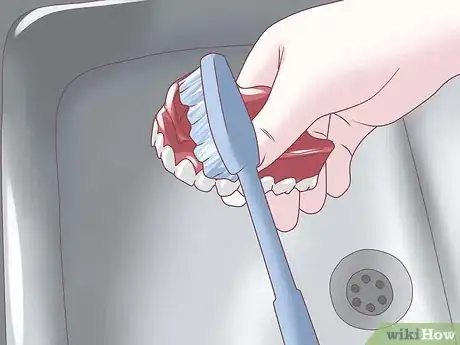

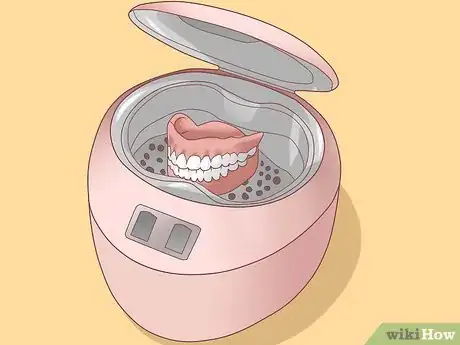
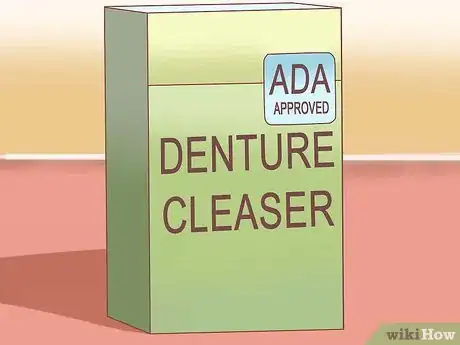
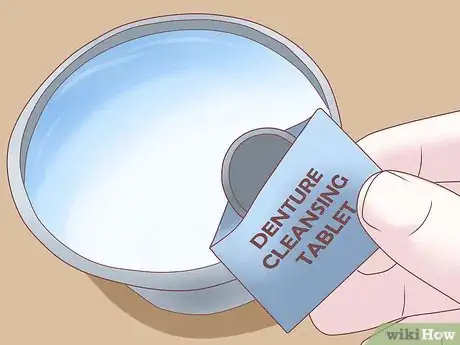
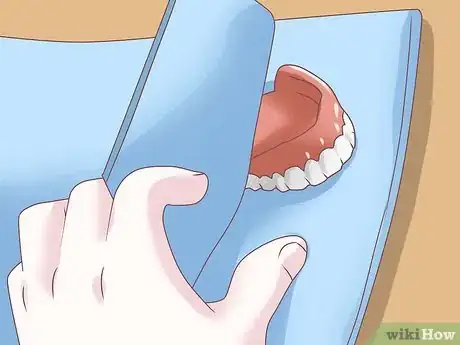
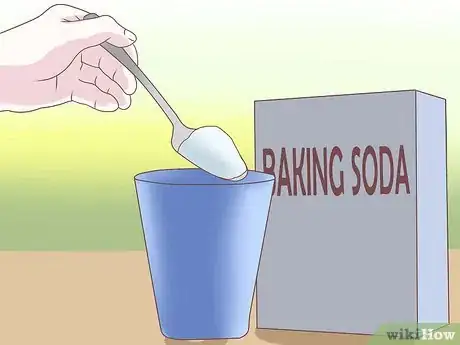
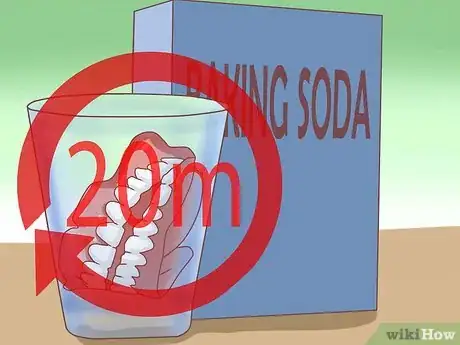

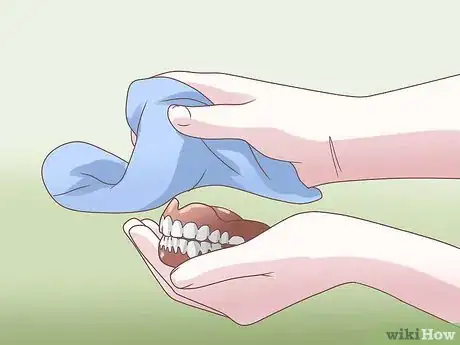


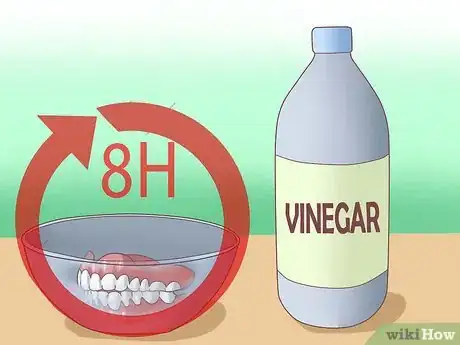
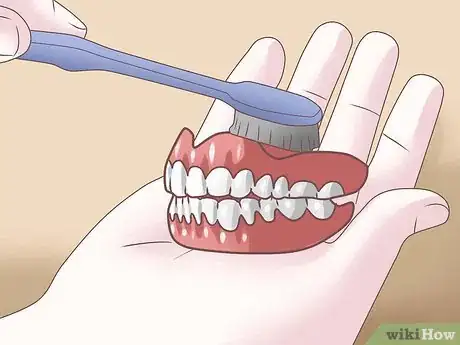

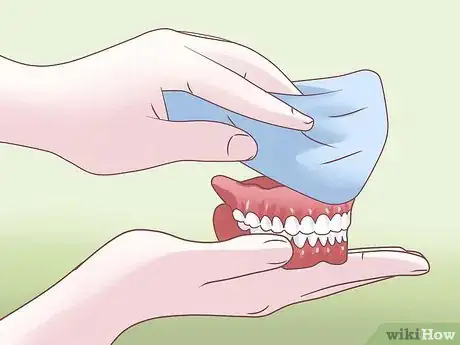
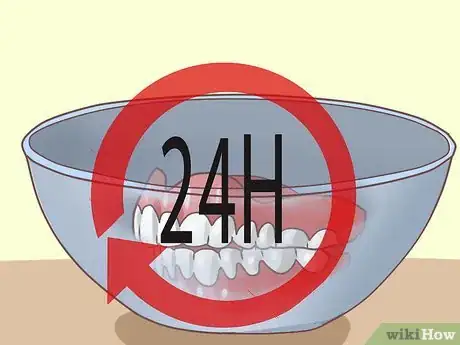
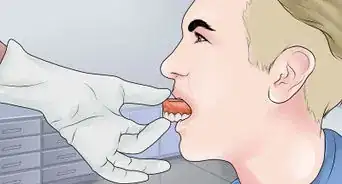
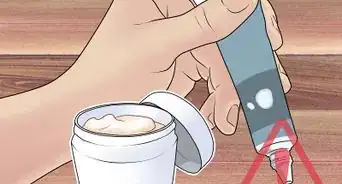

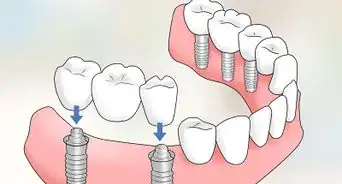

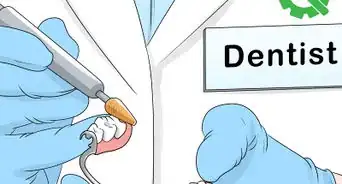
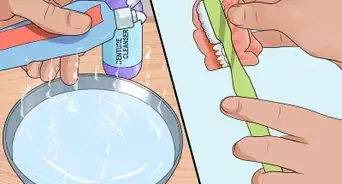
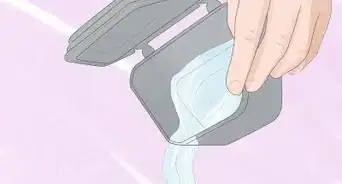
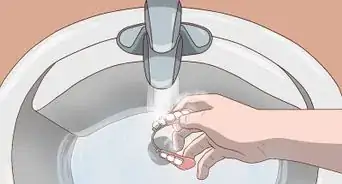
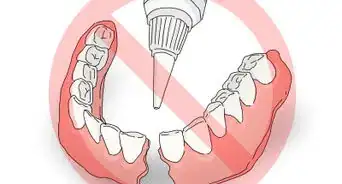






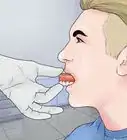
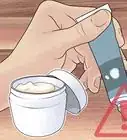

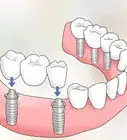



































Medical Disclaimer
The content of this article is not intended to be a substitute for professional medical advice, examination, diagnosis, or treatment. You should always contact your doctor or other qualified healthcare professional before starting, changing, or stopping any kind of health treatment.
Read More...